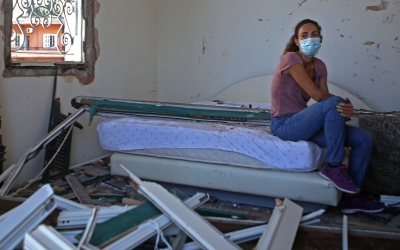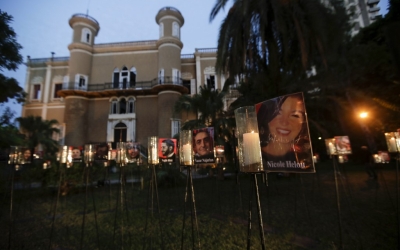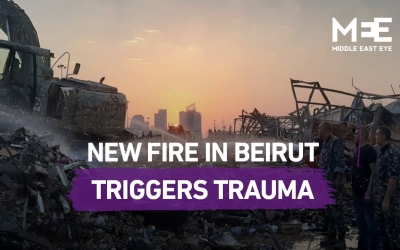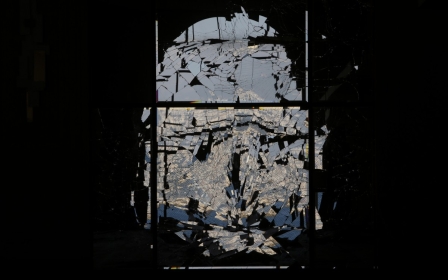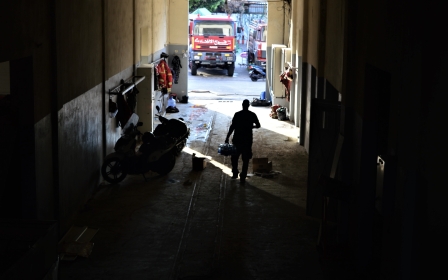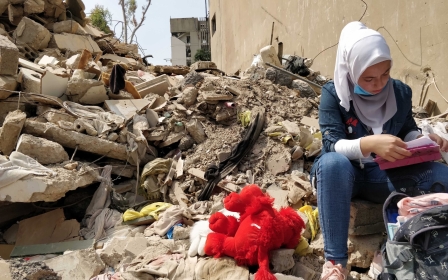Invisible wounds: Beirut witnesses mental-health crisis after blast
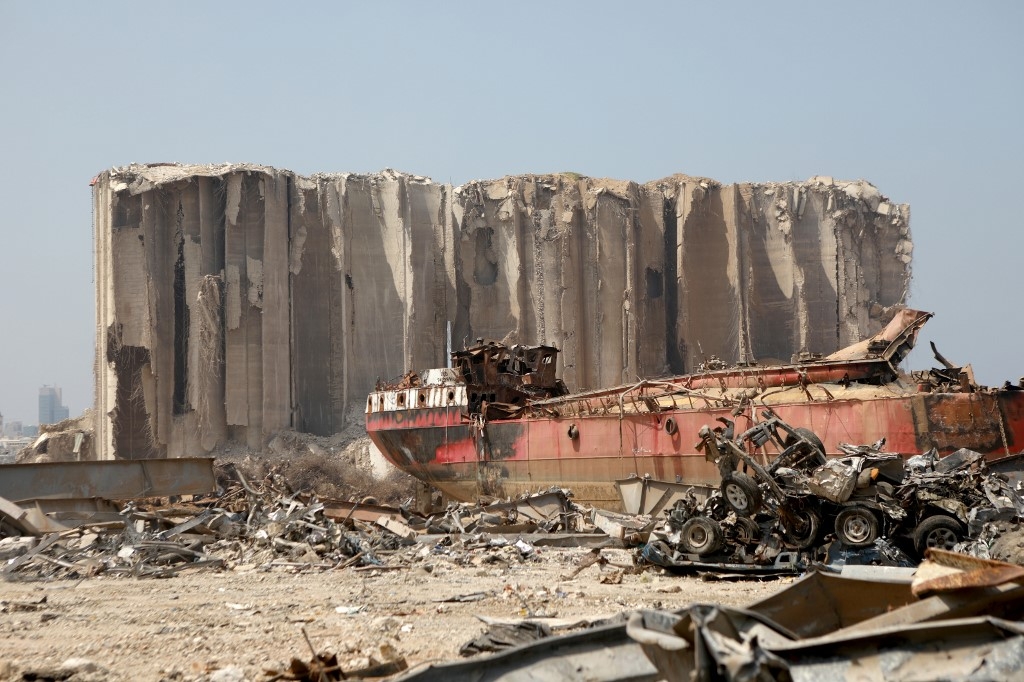
For Karla Matar, a psychologist and transformational coach, the Beirut port explosion that hit the capital last month was unlike anything she had experienced.
"In Lebanon, we recognise the sounds of the war," she told Middle East Eye from her studio in the Ashrafieh neighbourhood in the capital.
New MEE newsletter: Jerusalem Dispatch
Sign up to get the latest insights and analysis on Israel-Palestine, alongside Turkey Unpacked and other MEE newsletters
"We know the sound of a jet or a missile because we were used to them during wars, and we know how to cope. But this explosion differed completely from anything else."
Matar was referring to the detonation of 2,750 tonnes of ammonium nitrate, which produced a massive explosion that devastated Beirut's port and all the surrounding areas on 4 August.
Nearly 200 people died, 6,500 were injured, and around 300,000 displaced.
"I was at home when I heard the first explosion. I ran to the bathroom without thinking if it was a safe place for me. About one minute later, I heard the second explosion, and I wish nobody would experience that sound," Matar said.
"It was like an earthquake, and I could hear glass fall from the buildings. That experience was traumatising."
Collective trauma
In a city where people were already experiencing an unprecedented economic crisis and political instability, the explosion at Beirut's port left many more lives in despair.
It also left invisible psychological wounds in many, prompting mental-health organisations to take action to support those affected.
On the days following the blast, NGOs set up hotlines and walk-in clinics to support people suffering from mental distress, trauma and anxiety because of the explosion.
"The current situation in Lebanon created a complex collective trauma," Zeina Daccache, a therapist and a film director, said.
Daccache is the founder of Catharsis, a Lebanese centre for drama therapy. She partnered with organisations offering free online sessions on how to cope after the explosion.
"We received many phone calls from people who were in a state of shock," she told MEE.
"Some people wanted only to talk on the phone because they didn't have the energy to attend sessions. We advised them to spend time out of Beirut or go to the beach and attend some courses with other people. We also advised them to not read or watch too much news," she said.
Dr Hussein Najem, who works as a psychiatrist with international NGO Doctors Without Borders (MSF), told MEE that the collective trauma is not exclusive to those living in Beirut.
"We are experiencing collective trauma, not only as inhabitants of Beirut. Many people come from other cities of Lebanon to ask for support. We entered a state of shock," he said. "There are some people who think what has not happened in 15 years of civil war happened in three seconds."
Mental-health specialists say that while post-traumatic stress disorder (PTSD) often occurs two to three months following a trauma, people in Lebanon are experiencing other mental disorders, such as insomnia, depression, and anxiety.
Even the reconstruction of damaged areas in Beirut is a source of pain for many as they still see debris on the streets over a month later and hear the noise of the reconstruction, according to what Najem learned from his patients.
"When people experience such events, they don't respond only to this one, but they have a regression to their traumas," said Dr Celine Abi Rached, another psychologist with MSF.
The impact of the explosion on mental health has generated a higher demand for psychological support.
A day after the explosion, the Institute for Development, Research, Advocacy and Applied Care (IDRAAC) started a hotline and a free walk-in clinic for anyone who was affected.
IDRAAC also trained 25 psychologists who worked in different NGOs on how to provide psychological first aid.
The head of external affairs and the geriatric branch of the centre, Dr Georges Karam, said that it has supported between 15 and 18 people per day following the explosion. Now the average number of patients per day is eight.
'There are some people who think what has not happened in 15 years of civil war happened in three seconds'
- Dr Hussein Najem, psychiatrist
"Most of the people we supported in the first two to three weeks after the explosion suffered from an acute stress disorder. The cases of acute stress disorder decreased, but more low-income people have come to us because they knew we were giving free support," he said.
But the explosion on 4 August is not the only cause of the mental-health issues that many in Lebanon are suffering from.
The country's economic crisis and political instability have taken a toll on the mental health of many people, who feel insecure, depressed, and anxious.
"The population is getting poorer in Lebanon because of the economic crisis. Furthermore, people who had problems before the explosion are developing PTSD. If someone already suffered from trauma, the explosion triggered and amplified that condition," Karam said.
"I recently supported a 79-year-old lady who had been suffering from mental-health issues for a long time. She didn't want to talk with any psychologists. But when her house was destroyed by the blast, she convinced herself to come here because otherwise she would have killed herself," he said. "With this explosion people have become hopeless."
Children in trauma
Children, just like adults, are facing psychological consequences of Lebanon's seemingly never-ending string of disasters.
Psychologist Sacha Moughbgha and social worker Sally Rizk work for the Lebanese NGO Himaya, which deals with child protection.
They told MEE that many children are left afraid that the explosion will happen again, becoming scared of loud noises that remind them of what happened on 4 August.
"In the first stage of trauma, we help children with empathy and understanding and let them talk about their feelings. We help them rationalise some events that happened even though we can't control them. Then we tell parents how to deal with their children's behaviour and how to manage it," Moughbgha said.
Other events following the explosion have also jeopardised the mental health of many people already suffering from trauma.
The visit to Beirut by French President Emmanuel Macron on 1 September coincided with the centennial of the declaration of Greater Lebanon in 1920.
The Patrouille de France aerobatics unit celebrated this occasion with an air show over Beirut. But people expressed concerns because the noise of the French jets triggered them following the explosion.
Around the same time, the dramatic search for potential survivors in the Gemmayzeh neighbourhood a month after the blast, fires at Beirut's port on 8 and 10 September, and another fire that erupted in a Beirut shopping centre on 15 September have added to people's pain.
According to Karam, the events combined will have a long-term impact on mental health.
People will experience depression, anxiety, and PTSD in a few months, and these disorders will worsen if the situation doesn't change, he predicted.
Doctors need support too
The increasing demand for psychological support is paradoxically bringing added stress to psychologists, mental-health specialists and social workers.
In addition to facing their own personal trauma related to the explosion, they are dealing with the pressure of taking on more patients.
Matar had to recover from her own trauma before supporting other people by attending peer-to-peer sessions with her colleagues for 10 days.
Likewise, Abi Rached is healing by attending mental-health support sessions with her own psychotherapist.
"I didn't work for one week because I had to be strong for my patients. I am continuing to go to my psychotherapist twice a week to take care of my mental health for the patients I support. They need me now," she said.
But helping people could also be a relief for the specialists and social workers who work with people affected.
"Now, when I am working with MSF in Mar Mikhael, I feel better because I am helping people affected by trauma and other mental-health disorders," Abi Rached said.
Middle East Eye delivers independent and unrivalled coverage and analysis of the Middle East, North Africa and beyond. To learn more about republishing this content and the associated fees, please fill out this form. More about MEE can be found here.


